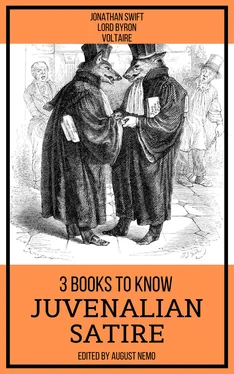So well not one of the aforesaid paints
As Saint Augustine in his fine Confessions,
Which make the reader envy his transgressions.
This, too, was a seal'd book to little Juan—
I can't but say that his mamma was right,
If such an education was the true one.
She scarcely trusted him from out her sight;
Her maids were old, and if she took a new one,
You might be sure she was a perfect fright;
She did this during even her husband's life—
I recommend as much to every wife.
Young Juan wax'd in goodliness and grace;
At six a charming child, and at eleven
With all the promise of as fine a face
As e'er to man's maturer growth was given:
He studied steadily, and grew apace,
And seem'd, at least, in the right road to heaven,
For half his days were pass'd at church, the other
Between his tutors, confessor, and mother.
At six, I said, he was a charming child,
At twelve he was a fine, but quiet boy;
Although in infancy a little wild,
They tamed him down amongst them: to destroy
His natural spirit not in vain they toil'd,
At least it seem'd so; and his mother's joy
Was to declare how sage, and still, and steady,
Her young philosopher was grown already.
I had my doubts, perhaps I have them still,
But what I say is neither here nor there:
I knew his father well, and have some skill
In character—but it would not be fair
From sire to son to augur good or ill:
He and his wife were an ill-sorted pair—
But scandal 's my aversion—I protest
Against all evil speaking, even in jest.
For my part I say nothing—nothing—but
This I will say—my reasons are my own—
That if I had an only son to put
To school (as God be praised that I have none),
'T is not with Donna Inez I would shut
Him up to learn his catechism alone,
No—no—I 'd send him out betimes to college,
For there it was I pick'd up my own knowledge.
For there one learns—'t is not for me to boast,
Though I acquired—but I pass over that,
As well as all the Greek I since have lost:
I say that there 's the place—but 'Verbum sat.'
I think I pick'd up too, as well as most,
Knowledge of matters—but no matter what—
I never married—but, I think, I know
That sons should not be educated so.
Young Juan now was sixteen years of age,
Tall, handsome, slender, but well knit: he seem'd
Active, though not so sprightly, as a page;
And everybody but his mother deem'd
Him almost man; but she flew in a rage
And bit her lips (for else she might have scream'd)
If any said so, for to be precocious
Was in her eyes a thing the most atrocious.
Amongst her numerous acquaintance, all
Selected for discretion and devotion,
There was the Donna Julia, whom to call
Pretty were but to give a feeble notion
Of many charms in her as natural
As sweetness to the flower, or salt to ocean,
Her zone to Venus, or his bow to Cupid
(But this last simile is trite and stupid).
The darkness of her Oriental eye
Accorded with her Moorish origin
(Her blood was not all Spanish, by the by;
In Spain, you know, this is a sort of sin);
When proud Granada fell, and, forced to fly,
Boabdil wept, of Donna Julia's kin
Some went to Africa, some stay'd in Spain,
Her great-great-grandmamma chose to remain.
She married (I forget the pedigree)
With an Hidalgo, who transmitted down
His blood less noble than such blood should be;
At such alliances his sires would frown,
In that point so precise in each degree
That they bred in and in, as might be shown,
Marrying their cousins—nay, their aunts, and nieces,
Which always spoils the breed, if it increases.
This heathenish cross restored the breed again,
Ruin'd its blood, but much improved its flesh;
For from a root the ugliest in Old Spain
Sprung up a branch as beautiful as fresh;
The sons no more were short, the daughters plain:
But there 's a rumour which I fain would hush,
'T is said that Donna Julia's grandmamma
Produced her Don more heirs at love than law.
However this might be, the race went on
Improving still through every generation,
Until it centred in an only son,
Who left an only daughter; my narration
May have suggested that this single one
Could be but Julia (whom on this occasion
I shall have much to speak about), and she
Was married, charming, chaste, and twenty-three.
Her eye (I 'm very fond of handsome eyes)
Was large and dark, suppressing half its fire
Until she spoke, then through its soft disguise
Flash'd an expression more of pride than ire,
And love than either; and there would arise
A something in them which was not desire,
But would have been, perhaps, but for the soul
Which struggled through and chasten'd down the whole.
Her glossy hair was cluster'd o'er a brow
Bright with intelligence, and fair, and smooth;
Her eyebrow's shape was like th' aerial bow,
Her cheek all purple with the beam of youth,
Mounting at times to a transparent glow,
As if her veins ran lightning; she, in sooth,
Possess'd an air and grace by no means common:
Her stature tall—I hate a dumpy woman.
Wedded she was some years, and to a man
Of fifty, and such husbands are in plenty;
And yet, I think, instead of such a ONE
'T were better to have TWO of five-and-twenty,
Especially in countries near the sun:
And now I think on 't, 'mi vien in mente,'
Ladies even of the most uneasy virtue
Prefer a spouse whose age is short of thirty.
'T is a sad thing, I cannot choose but say,
And all the fault of that indecent sun,
Who cannot leave alone our helpless clay,
But will keep baking, broiling, burning on,
That howsoever people fast and pray,
The flesh is frail, and so the soul undone:
What men call gallantry, and gods adultery,
Is much more common where the climate 's sultry.
Happy the nations of the moral North!
Where all is virtue, and the winter season
Sends sin, without a rag on, shivering forth
('T was snow that brought St. Anthony to reason);
Where juries cast up what a wife is worth,
By laying whate'er sum in mulct they please on
The lover, who must pay a handsome price,
Because it is a marketable vice.
Alfonso was the name of Julia's lord,
A man well looking for his years, and who
Was neither much beloved nor yet abhorr'd:
They lived together, as most people do,
Suffering each other's foibles by accord,
And not exactly either one or two;
Yet he was jealous, though he did not show it,
For jealousy dislikes the world to know it.
Julia was—yet I never could see why—
With Donna Inez quite a favourite friend;
Between their tastes there was small sympathy,
For not a line had Julia ever penn'd:
Some people whisper but no doubt they lie,
For malice still imputes some private end,
That Inez had, ere Don Alfonso's marriage,
Forgot with him her very prudent carriage;
And that still keeping up the old connection,
Which time had lately render'd much more chaste,
She took his lady also in affection,
And certainly this course was much the best:
She flatter'd Julia with her sage protection,
And complimented Don Alfonso's taste;
And if she could not (who can?) silence scandal,
At least she left it a more slender handle.
I can't tell whether Julia saw the affair
With other people's eyes, or if her own
Читать дальше












